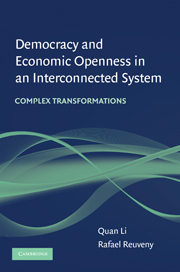Book contents
- Frontmatter
- Contents
- List of Figures and Tables
- Acknowledgments
- 1 Introduction
- PART I THE DEMOCRACY–ECONOMY NEXUS
- 2 Democracy and Economic Openness
- 3 Democracy, Economic Openness, and Income Inequality
- 4 Democracy and Development
- PART II BRINGING IN CONFLICT
- PART III BRINGING IN THE ENVIRONMENT
- References
- Author Index
- Subject Index
2 - Democracy and Economic Openness
Published online by Cambridge University Press: 05 June 2012
- Frontmatter
- Contents
- List of Figures and Tables
- Acknowledgments
- 1 Introduction
- PART I THE DEMOCRACY–ECONOMY NEXUS
- 2 Democracy and Economic Openness
- 3 Democracy, Economic Openness, and Income Inequality
- 4 Democracy and Development
- PART II BRINGING IN CONFLICT
- PART III BRINGING IN THE ENVIRONMENT
- References
- Author Index
- Subject Index
Summary
INTRODUCTION
We begin our analytical journey with an analysis of the causal flow from economic openness to democracy, which stands at the center of the conceptual layout of the book in Figure 1.1. The issue we seek to investigate in this chapter is in fact much broader than the components of openness itself; it falls under the umbrella of economic globalization. A popular interpretation of this phenomenon is the gradual turning of separate national economies, each operating in its own domain, into a set of national economies heavily entangled with one another, affecting and being affected by the economic forces operating in other countries in the world much in the same way that the economy of the state of Texas is affected by and affects, for example, the economies of the states of California or Florida in the United States. As noted, the causal relationship of interest falls under the umbrella of the globalization discourse; therefore, we use the terms “economic globalization” and “economic openness” interchangeably.
Two questions stand at the core of our investigation in this chapter. Does economic globalization affect the level of democracy? Is deepening integration into the world economy associated with a decline or rise of democratic governance? These questions have captured the imagination of policymakers and academic scholars alike. Various answers have been provided, and policy recommendations have been made. Anecdotal evidence is typically invoked in debates, but systematic evidence is scarce. This chapter seeks to fill this empirical lacuna.
- Type
- Chapter
- Information
- Democracy and Economic Openness in an Interconnected SystemComplex transformations, pp. 23 - 61Publisher: Cambridge University PressPrint publication year: 2009

